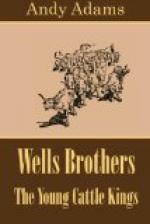The taking of so many pelts looked like an impossible task for a boy. But Dell recalled, among the many experiences with which Forrest, when a cripple, regaled his nurses, was the skinning of winter-killed cattle with a team. The same principle applied in pelting a wolf, where by very little aid of a knife, about the head and legs, a horse could do the work of a dozen men. The corral fence afforded the ready snubbing-post, Dog-toe could pull his own weight on a rope from a saddle pommel, and theory, when reduced to the practical, is a welcome auxiliary. The head once bared, the carcass was snubbed to the centre gate post, when a gentle pull from a saddle horse, aided by a few strokes of a knife, a second pull, and the pelt was perfectly taken. It required steady mounting and dismounting, a gentle, easy pull, a few inches or a foot, and with the patience of a butcher’s son, Dog-toe earned his corn and his master a bale of peltry.
Evening brought report of further annoyance of wolves. New packs had evidently joined forces with the remnants of the day before, as there was neither reduction in numbers nor lessening in approach or attitude.
“Ours are the only cattle between the Republican River in Nebraska and the Smoky River in this State,” said Joel, in explanation. “Rabbits and other rodents are at home under this sleet, and what is there to live on but stock? You have to hold the cattle under the closest possible herd to avoid attack.”
“That will made the fighting all the better,” gloatingly declared Dell. “Dog-toe and I are in the fur business. Let the wolves lick the bones of their brethren to-night, and to-morrow I’ll spread another banquet.”
The few days’ moderation in the weather brought a heavy snowfall that night. Fortunately the herd had enjoyed two days’ grazing, but every additional storm had a tendency to weaken the cattle, until it appeared an open question whether they would fall a prey to the wolves or succumb to the elements. A week of cruel winter followed the local storm, during which three head of cattle, cripples which had not fully recuperated, in the daily march to the divides fell in the struggle for sustenance and fed the wintry scavengers. It was a repetition of the age-old struggle for existence—the clash between the forces of good and evil, with the wolf in the ascendant.
The first night which would admit of open water, thirty-one wolves fell in the grip of poison. It was give and take thereafter, not an eye for an eye, but in a ratio of ten to one. The dug-out looked like a trapper’s cave, carpeted with peltry, while every trace of sentiment for the enemy, in the wintry trial which followed, died out in the hearts of the boys.
Week after week passed, with the elements allied with the wolves against the life of the herd. On the other hand, a sleepless vigilance and sullen resolve on the part of the besieged, aided by fire and poison, alone held the fighting line. To see their cattle fall to feed the wolves, helpless to relieve, was a bitter cup to the struggling boys.




